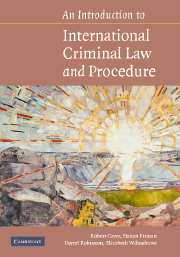Book contents
- Frontmatter
- Contents
- Preface
- Table of Cases
- Table of Treaties
- Table of Abbreviations
- Part A Introduction
- Part B Prosecutions in National Courts
- Part C International Prosecutions
- Part D Substantive Law of International Crimes
- Part E Principles and Procedures of International Prosecutions
- Part F Relationship Between National and International Systems
- 19 State Cooperation with the International Courts and Tribunals
- 20 Immunities
- 21 Conclusions: The Future of International Criminal Law
- Index
- References
20 - Immunities
- Frontmatter
- Contents
- Preface
- Table of Cases
- Table of Treaties
- Table of Abbreviations
- Part A Introduction
- Part B Prosecutions in National Courts
- Part C International Prosecutions
- Part D Substantive Law of International Crimes
- Part E Principles and Procedures of International Prosecutions
- Part F Relationship Between National and International Systems
- 19 State Cooperation with the International Courts and Tribunals
- 20 Immunities
- 21 Conclusions: The Future of International Criminal Law
- Index
- References
Summary
Introduction
Overview
The law of immunities has ancient roots in international law, extending back not hundreds, but thousands, of years. In order to maintain channels of communication and thereby prevent and resolve conflicts, societies needed to have confidence that their envoys could have safe passage, particularly in times when emotions and distrust were at their highest. Domestic and international law developed to provide both inviolability for the person and premises of a foreign State's representatives and immunities from the exercise of jurisdiction over those representatives.
While immunities are valuable in preventing interference with representatives, and thereby maintaining the conduct of international relations, they can also lead to serious injustice. In recent decades, with the advent of the human rights movement, States have taken stronger and stronger steps to prosecute international criminals. This emboldened State practice has brought to the fore many hidden or unresolved questions as to the boundaries between principles of accountability and immunity, and has engendered a reassessment and restriction of the scope of immunities.
The resulting jurisprudence and authorities may at first glance appear perplexing, contradictory, confused or incoherent. This chapter will suggest that the authorities in fact present a consistent and coherent set of rules, and that those rules reflect an underlying balancing between competing international ‘goods’. To understand the jurisprudence and its significance, it will be necessary (1) to appreciate the underlying principles and protected values, (2) to distinguish between ‘functional’ immunities and ‘personal’ immunities and (3) to distinguish between national and international courts.
- Type
- Chapter
- Information
- An Introduction to International Criminal Law and Procedure , pp. 422 - 445Publisher: Cambridge University PressPrint publication year: 2007



